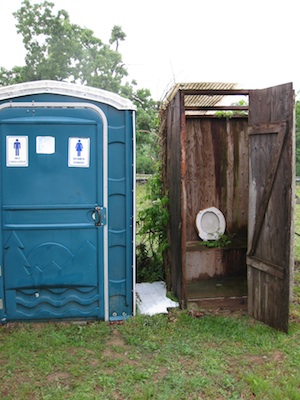
Photo © Lisa R. Pruitt 2010
The closing line of my recent blog post asked: "Is even democracy a luxury for the poor?"
Shortly after writing it, I came across this quote by Senator John D. Rockefeller IV, featured in the obituary of Senator Robert C. Byrd who died last week. Regarding the vast federal aid that Byrd garnered for West Virginia over the years, Rockefeller said Byrd knew that “before you can make life better, you have to have a road to get in there, and you have to have a sewerage system.”
This comment resonated with me, struck me as accurate. Yet it ran counter to my thinking about Robert C. Byrd for the past few decades. While I have always considered Byrd a fine man (well, aside from his Klan membership as a younger man) and appreciated his dedication to the Senate, I saw him primarily as a poster child for the excesses of pork barrel politics. Rarely was he in the news, it seems, without some mention of the federal aid he was able to channel to West Virginia. Indeed, his obituary in the New York Times states that he built, "always with canny political skills, a modern West Virginia with vast amounts of federal money." Elsewhere, it includes this quote from Senator Byrd himself, “I lost no opportunity to promote funding for programs and projects of benefit to the people back home.” He referred to West Virginia as "one of the rock bottomest of states."
Rockefeller's comment, however, reminded me of what was at stake with all that aid for West Virginia. It was not only welcome centers and courthouses and such. It was the state's development from an economic backwater, which requires roads and bridges. As Rockefeller observed, advanced sanitation makes a big difference, too. Indeed, it goes hand in hand with education and other health and human services in enhancing the state's human capital.
The quote from Rockefeller also reminded me of this provocative line from Aravind Adiga's The White Tiger (2008): "If I were making a country, I'd get the sewage pipes first, then the democracy." The White Tiger is a story from the other side of the world—from India—but it is related to what Byrd tried to do for West Virginia in several senses. The Indian story—like the story of many West Virginians—is about rural poverty. Its social, geographic, and economic context is the uneven development that has left rural India's residents behind while much of the rest of the nation zooms ahead in the name of progress (and, of course, capitalism). Parallels to rural West Virginia are apparent.
We city dwellers don't think much about sewage pipes. We take them for granted. But lots of people in the U.S. and in India don't have them. Indeed, some don't even have clean water. (Read U.S. stories here and here.) When those living in metropolitan areas fret about roads, it is about getting a car pool lane, or sound walls, or even a whole new freeway. In rural areas, residents fret about how to get your (dirt) road graded, never mind getting it paved. (Read stories about the economic significance of road building in India, too, here and here).
Both the Rockefeller and Adiga quotes suggest the power of government to lift people out of poverty—perhaps even the nation state's duty to do so. If we agree that the government should play a role in responding to deprivation, is it fair for West Virginia to get more federal aid (assuming that it does on, say, a per capita basis) than, for example, Pennsylvania or Washington or Florida? Wouldn't it represent distributive equity to give West Virginia and similarly deprived states more? Of course, the Indian Constitution recognizes some socio-economic rights, e.g., the right to life, which has been construed to obligate the state to provide a certain healthcare and education infrastructure. The U.S. Constitution makes no similar provision, protecting only civil and political rights. (Yet, as Robert Byrd once pointed out, "The Constitution does not prohibit humble servants from delivering whatever they can to their constituents").
Constitutional and other legal mandates aside, the question remains: what should government do in the face of grossly uneven development and the resulting spatial inequalities in access to infrastructure and services? What is just and ethical? I've been writing recently about Amartya Sen and Martha Nussbaum's capabilities framework for assessing well-being, including their thinking about government's role in endowing residents with core capabilities such as those life and bodily health. I'm recalling Sen's use of the phrase "antecedent inequality" to justify giving more to those with less, to raise them to a sort of parity with the "haves." That has me reflecting on Robert Byrd's career a little differently than I previously had. I'm now wondering: is it really "pork" if it responds to antecedent inequalities? If getting sewage pipes into rural places—be they in West Virginia or India—helps rural residents achieve a minimum level of well-being, shouldn't we be doing it?
To circle back to democracy for a moment, consider this quote from Sen about the very nature of development:
Development consists of the removal of various types of unfreedoms that leave people with little choice and little opportunity of exercising their reasoned agency.
That leaves me wondering: At what point are citizens so deprived of what they need to survive—what Nussbaum refers to the as the life and bodily health capabilities—that they are effectively incapable of exercising the civil and political rights so valued by liberal democracies. Isn't the lack of sewage pipes and other basic infrastructure an "unfreedom" that cries out for development—whether in India or West Virginia?
Cross posted to SALTLaw.org/blog and Legal Ruralism.